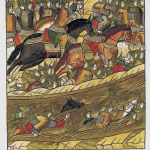Originally posted on iBrattleboro.com 10/28/2008
When I was ten, I borrowed a book from the School library called Capitalism, Communism, Socialism, which purported to explain the various economic systems to ten year olds. My parents made me take it back because they said little children should not be reading about dangerous ideas like communism. I showed them — in my senior year of high school, I wrote a term paper on The Communist Manifesto.
Despite this early interest in economics, I realized recently that I have almost no idea what capitalism really is, despite the fact that I use the word all the time. So this essay is an effort to learn.
Here’s the dictionary definition: Capitalism is an economic system in which capital — money and other assets — are held by private individuals rather than the state. I have never quibbled with this definition because it seems to describe, albeit thinly, the system I’ve known all my life. What it doesn’t explain is that capital is not distributed evenly throughout society but concentrated in the hands of a relative few, who then hire the rest of us to do the work of helping them create capital.
For several hundred years now, few have dared question the dominance of capitalism as the world’s “good” economic system. But recent cracks in that system have prompted even such staunchly establishment papers as the Washington Post and the New York Times to run columns questioning the underpinnings of that system.
What was even more stunning was former Fed chair Alan Greenspan’s admission before Congress that he had discovered a flaw in free market capitalism, which is, put simply, that capitalists do not always act in their own best interest, but can be tempted to risk long term stability for short term gain. Banks — long considered the backstop of capitalism — let their judgment become so clouded by the enormous profits they were reaping through bad lending that they literally bankrupted themselves when their bets began to go sour.
Enter the taxpayer! What? the taxpayer? Now that doesn’t usually happen in capitalism… But never mind. What’s going on right now is by all accounts extraordinary, and extraordinary dangers call for extraordinary measures to combat them. Or so we are told.
Leaving aside the various taxpayer bailouts, we still haven’t agreed as to just what this credit crisis is exactly. What we were initially told was that it was a liquidity crisis — that banks and other financial firms are being blocked from borrowing and lending as they would normally do, and so money had dried up. But increasingly, some economists are arguing a different line. They say that it isn’t a liquidity crisis but a solvency crisis. Solvency means having enough money (assets) to repay debts. It isn’t just that banks don’t have money to loan — they don’t even have enough to pay current obligations. Which makes them technically bankrupt. And there are a lot of banks in this boat — big ones as well as smaller ones.
But the question all this raises is why borrowing and lending were necessary on this scale. Part of the answer is simple greed. By lending more than they should and approving more loans, banks could realize more in fees on those loans, thus increasing profits. By packaging and selling loans, banks hoped to avoid losing money if the loans went bad. In many cases, banks were off the hook after 90 days making this a hot potato game — who will get stuck with the bad loans?
There are a few aspects of capitalism that are important but not part of the official definition. First of all, capitalists, by definition, have vast, enormous fortunes. What do they do with these fortunes? They use them to create bigger ones. How do they do this? By investing in (loaning to) other people’s businesses, with the requirement that they receive a “return” on that investment.
It should come as no surprise that under this system, capital becomes concentrated in the hands of a relative few while everyone else is forced to borrow to have money to work with. This is because it’s really hard for the average person on an average salary to save enough to start a business of any size without outside investment or bank loans.
Today, it’s also impossible to do a lot of other things without incurring debt. You can’t go to college in most cases, or buy a house or car. Medical care often leads to debt, and for some, just buying food, gasoline, and other essentials requires someone else’s money. This is a strange system. It means that even such basic needs as housing, transportation, education and health care are financed, to some degree, by debt. Sure, credit cards keep down the numbers of loan sharks and pawn shops. But in the end, it all boils down to the same thing — life costs more than most people can afford. And that makes no sense at all.
Is capitalism, per se, responsible for this sorry state of affairs? Well, let’s see. The goal of any good capitalist outfit is to maximize profits and increase shareholder wealth. Since many Americans are shareholders, we are supposed to share the wealth too, but in reality, most small investors don’t share equally. Meanwhile, many of these small investors have incurred a lot of debt, trying to keep up with the costs of living in a “grow or die” capitalist economy. When investments go bad, the debt starts to go bad with it, and the effects spiral through the economy, leading to the dreaded cascade effect — if you’ve ever played dominos, you know what this means.
So we’re in the soup now. How ironic that by following the rules of capitalism, it was possible to bankrupt all participants. And what do we do now that collectively, everyone from the biggest banks to the smallest home owners owe more than they are worth?
Regardless of how we muddle through this crisis, one thing’s for sure — everyone, regardless of station, is going to going to have to start living within their means. And that reality check is likely to be the harshest blow of all to a nation whose people thought, just a few years ago, that anyone could become a millionaire.




